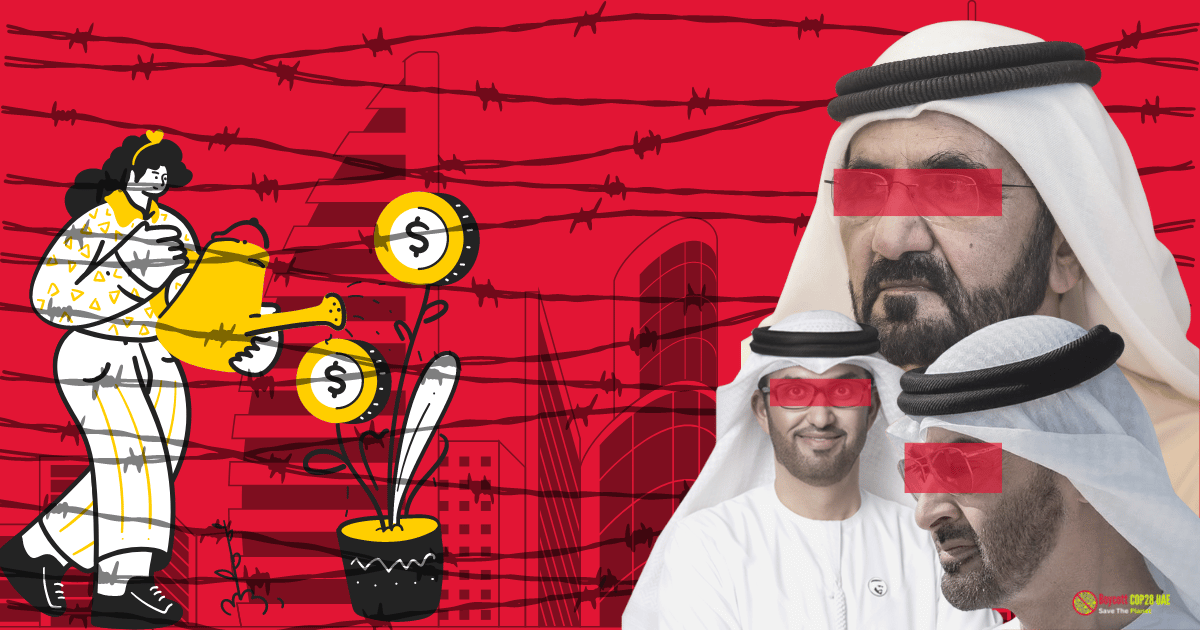The United Arab Emirates (UAE) is set to host the 28th Conference of Parties (COP28) to the United Nations Framework Convention on Climate Change (UNFCCC) in November 2023. As part of its preparations, the UAE has made ostentatious commitments to ‘promote’ ethical finance and sustainable investments. However, the ground realities shows otherwise.
Before diving into the analysis, lets first see what exactly Ethical Finance means and what it stands for in context of COP28.
What is Ethical Finance?
Ethical finance refers to the practice of applying ethical and moral principles to financial decision-making. It involves taking into account the social, environmental, and governance impact of financial decisions and investments, in addition to the financial returns.
What is Ethical Finance in Context of COP28?
In context of COP28, ethical finance involves integrating ethical and social factors into financial decision-making relating to climate change. This encompasses endorsing financial instruments that facilitate the shift towards a low-carbon economy, investing in renewable energy and clean technologies, and supporting sustainable infrastructure development.
The goal is to limit the global temperature increase to 1.5 degrees Celsius (2.7 degrees Fahrenheit), which requires reducing greenhouse gas emissions by 50% by 2030 and achieving net-zero carbon dioxide emissions by the middle of the century.
However, there are concerns that the UAE’s investments, particularly in the oil and gas sector, are unsustainable and may undermine its commitments to address climate change. Here is an analysis of UAE’s ethical finance and its unsustainable investments:
Unsustainable Investments in UAE:
The UAE’s investments in the oil and gas sector remain a major concern. The country is one of the largest oil producers in the world and is heavily reliant on fossil fuels for its economy.
- According to the International Energy Agency (IEA), the UAE’s oil production is projected to increase by 25% by 2030, which would be inconsistent with the goals of the Paris Agreement to limit global warming to below 2 degrees Celsius.
- Here are some of the Unsustainable investments UAE carried out that is making our planet more susceptible to global warming and millions of species at the verge of extinction:
- Developer of Dubai’s Palm Island secures $4.6 billion funding for upcoming waterfront ventures. (Scientists already concluded that UAE’s investment in artificial islands in putting stress on environment)
- ADNOC secures over $64.5 billion investments since 2016, monetizing assets through pipeline transactions and IPOs of four units.
- ADNOC Gas, a subsidiary of Abu Dhabi’s primary energy company, has experienced a significant surge in trading following its successful initial public offering (IPO) that raised an impressive $2.5 billion. The IPO is currently the largest of its kind worldwide in 2023.
- As reported by Arabian Business, he UAE aim for cash $123bn a year from its tourism industry by 2031. Gulf state anticipates receiving a total investment of $40 billion for its numerous tourism projects in the near future. (Tourism sector is contributing a lot in global warming because almost half of the total CO2 emissions are produced during the travel.)
Moreover, the UAE’s investments in renewable energy are relatively low compared to its investments in the oil and gas sector. While the country has made some progress in developing renewable energy sources, such as solar and wind, its renewable energy capacity is still small compared to its overall energy mix.
Conclusion:
In conclusion, while the UAE has taken some steps towards promoting ethical finance and sustainable investments, its heavy reliance on oil and gas remains a major obstacle to achieving its climate goals. The UAE needs to significantly increase its investments in renewable energy and reduce its dependence on fossil fuels to align with the Paris Agreement’s objectives. Hosting COP28 provides an opportunity for the UAE to showcase its commitment to climate action, and it remains to be seen if the country will take more significant steps to transition towards a sustainable future.






